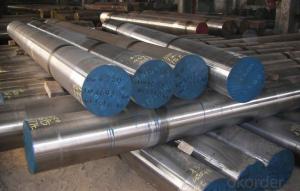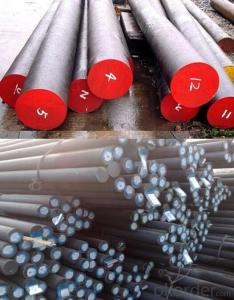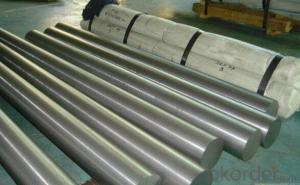Alloy Steel SCr420H AISI 5120
- Loading Port:
- Shanghai
- Payment Terms:
- TT OR LC
- Min Order Qty:
- 30 m.t.
- Supply Capability:
- 120000 m.t./month
OKorder Service Pledge
OKorder Financial Service
You Might Also Like
AISI 5120 Alloy Steel SCr420H
Specification
1, Diameter: 8mm-250mm rounds
5mm-9mm rods
2, Length: 2m, 3m, 5.8m, 6m or customized
3, Standard: GB, ASTM, AISI, SAE, DIN, JIS, EN
OEM technology - send detailed technical parameters for accurate quotation.
2, Produce Process: smelt iron - EAF smelt billet - ESR smelt billet -
hot rolled or forged to get the steel round bar and plate
3, Heat Treatment: annealing, normalizing, tempering, quenching
4, Surface Treatment: Black, Polished, Galvanized
5, Quality Assurance: We accept third party inspection for all orders.
You can ask testing organizations such as SGS, BV, etc. to test our products before shipping.
Chemical Composition
| C | Si | Mn | Cr | S | P | Ni | Cu |
| 0.18~0.24 | 0.17~0.37 | 0.50~0.80 | 0.70~1.00 | ≤0.035 | ≤0.035 | ≤0.030 | ≤0.030 |
Products Show
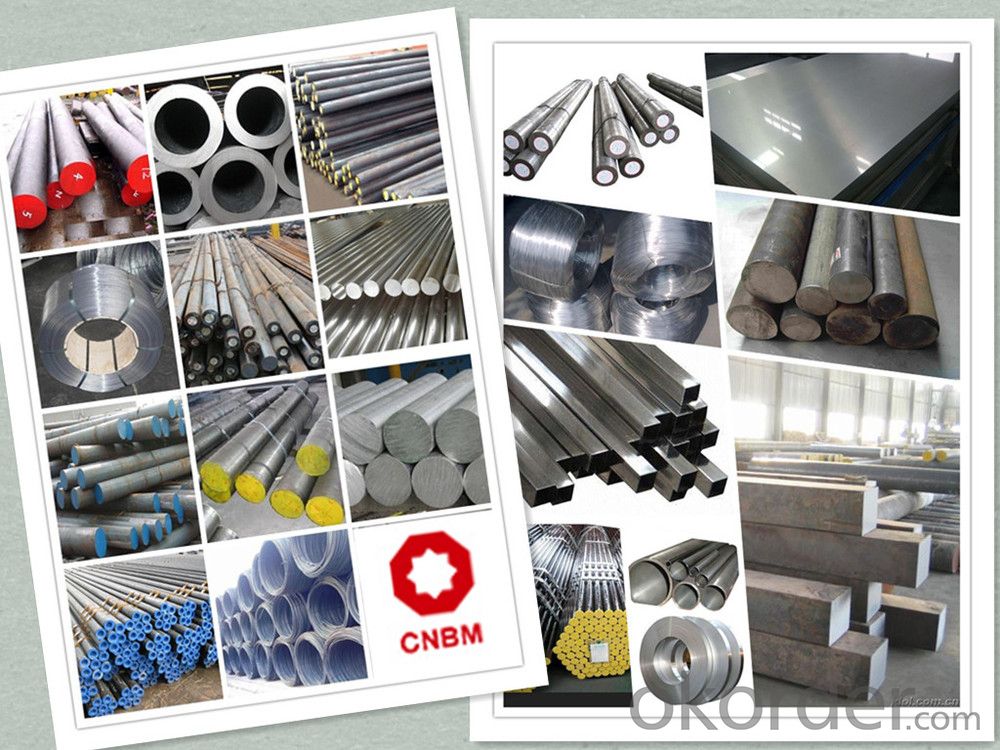
Product Overviews
Description | Carbon Steel Rod/Carbon Steel Bar,carbon steel rod,carbon steel shaft,mild steel bar, Mild steel shaft,ms bar | |
Material | ASTM | 1005, 1006, 1008, 1010, 1015, 1020, 1025, 1030, 1035, 1040, 1045, 1050, 1055, 1060, 1065, 1070, 1080, 1084, 1016, 1022 |
DIN | Ck10, Ck15, Ck22, Ck25, Ck30, Ck35, Ck40,Ck45, Ck50, 30Mn4, 40Mn4 | |
BS | 040A04, 095M15, 045M10, 080A40, 045M10, 080M50 | |
JIS | S09CK, S9CK, S10C, S15C, S20C, S25C, S30C, S35C, S40C, S45C, S50C, S55C, S58C, SB45, S30C, S40C, S45C, S53C | |
Standard | GB/T799, ASTM A29, A108, A321, A575, BS970, DIN1652, JIS G4051 | |
| Section shape | Round, square, hexagonal, flat, angle | |
| Surface | Black painted, galvanized | |
Specifications | Round bar | Diameter: 4mm~1200mm |
Angle bar | Size: 3mm*20mm*20mm~12mm*800mm*800mm | |
Square bar | Size: 4mm*4mm~100mm*100mm | |
Flat bar | Thickness: 2mm~100mm | |
Width: 10mm~500mm | ||
| Hexagonal | Size: 4mm~800mm | |
Length | 2m, 4m, 5.8m, 6m, 11.8m, 12m or as required. | |
Work Shop
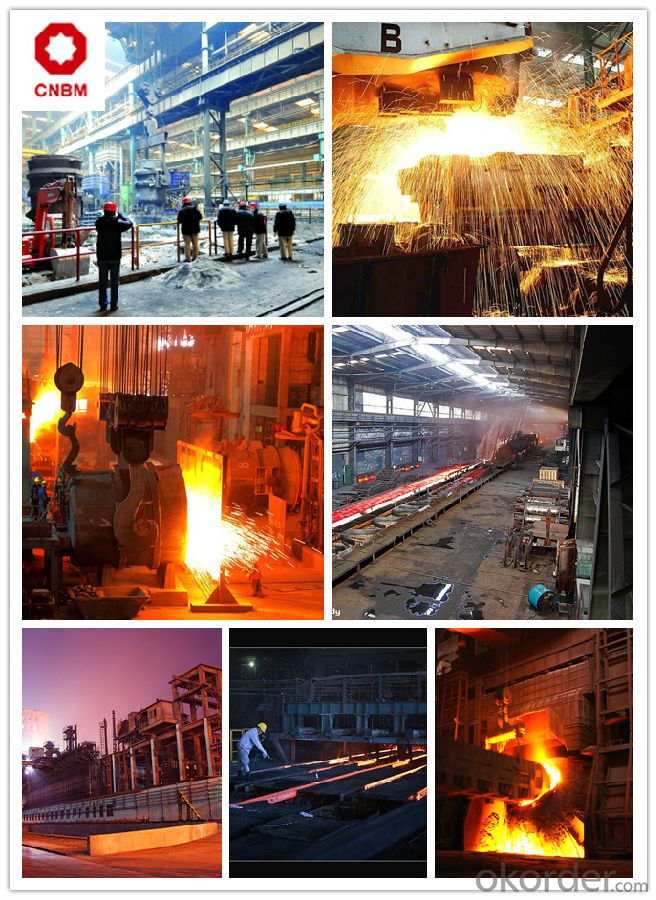
Company Information
CNBM International Corporation is the most important trading platform of CNBM group.
Whith its advantages, CNBM International are mainly concentrate on Cement, Glass, Iron and Steel, Ceramics industries and devotes herself for supplying high qulity series of refractories as well as technical consultancies and logistics solutions.

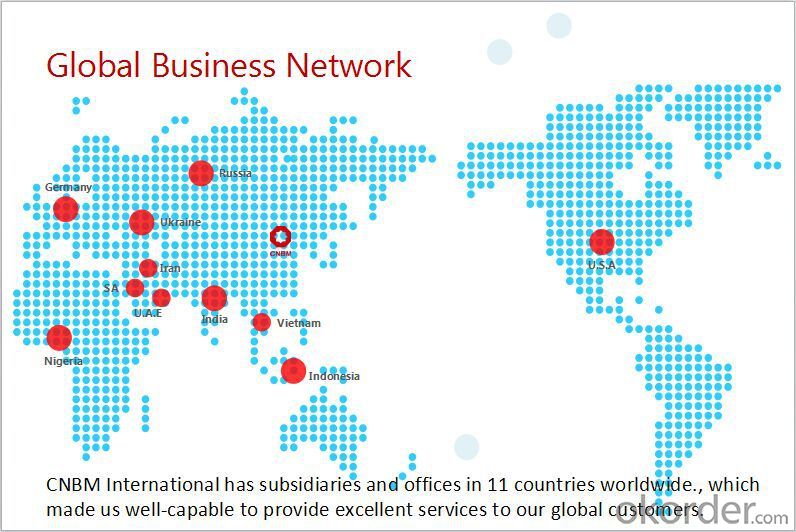
FAQ
1, Your advantages?
professional products inquiry, products knowledge train (for agents), smooth goods delivery, excellent customer solution proposale
2, Test & Certificate?
SGS test is available, customer inspection before shipping is welcome, third party inspection is no problem
3, Factory or Trading Company?
CNBM is a trading company but we have so many protocol factories and CNBM works as a trading department of these factories. Also CNBM is the holding company of many factories.
4, Payment Terms?
30% TT as deposit and 70% before delivery.
Irrevocable L/C at sight.
5, Trading Terms?
EXW, FOB, CIF, FFR, CNF
6, After-sale Service?
CNBM provides the services and support you need for every step of our cooperation. We're the business partner you can trust.
For any problem, please kindly contact us at any your convenient time.
We'll reply you in our first priority within 24 hours.
Packaging & Delivery
1, Packaging: seaworthy package or as required
2, Delivery: 35-45 days or based on quantity
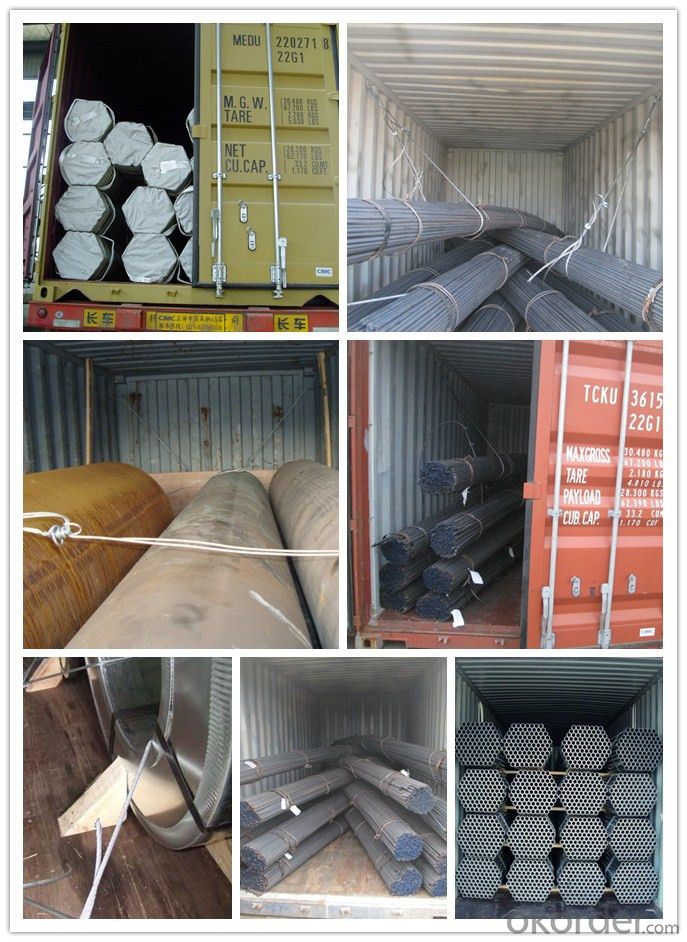
- Q: What are the different types of steel round bars used in the manufacturing of valves and fittings?
- Valves and fittings in manufacturing commonly utilize various types of steel round bars. These options include: 1. Carbon Steel Round Bars: Frequently employed in valve and fitting manufacturing, carbon steel round bars possess notable attributes such as strength, durability, and the ability to withstand high temperatures and pressures. 2. Stainless Steel Round Bars: Ideal for valves and fittings that come into contact with liquids or gases, stainless steel round bars exhibit high resistance to corrosion. They are also known for their exceptional strength and mechanical properties. 3. Alloy Steel Round Bars: Alloy steel round bars are created by incorporating alloying elements like chromium, manganese, and nickel into carbon steel. This enhances their strength, hardness, and resistance to wear and tear, making them suitable for demanding valve and fitting applications. 4. Duplex Steel Round Bars: Combining ferrite and austenite phases, duplex steel round bars are a specific type of stainless steel. This unique blend grants them excellent strength, corrosion resistance, and resistance to stress corrosion cracking, making them well-suited for valves and fittings in harsh environments. 5. Nickel Alloy Round Bars: Known for their outstanding resistance to corrosion and high-temperature applications, nickel alloy round bars possess excellent mechanical properties. They are commonly utilized in valves and fittings that handle corrosive fluids or operate in extreme temperatures. When manufacturing valves and fittings, it is crucial to select the appropriate steel round bar based on the specific requirements of the application. Factors to consider include pressure, temperature, fluid compatibility, and environmental conditions.
- Q: How do you calculate the weight of a steel round bar based on its volume and density?
- To determine the weight of a steel round bar based on its volume and density, one can utilize the following formula: Weight = Volume x Density Initially, ascertain the volume of the round bar. The volume of a cylinder, which represents the shape of a round bar, can be computed using the subsequent equation: Volume = π x (diameter/2)^2 x length Here, π denotes a mathematical constant that is roughly equivalent to 3.14159, and the diameter and length are the measurements of the round bar. Once the volume is determined, it is necessary to know the density of the steel. The density of steel may differ depending on the type and grade of steel employed. Typically, density is measured in kilograms per cubic meter (kg/m^3) or pounds per cubic inch (lbs/in^3). The density of steel can be found in reference materials or on the internet. Ultimately, the volume should be multiplied by the density to acquire the weight of the steel round bar. Ensure that the units of volume and density are consistent. For instance, if the volume is given in cubic inches and the density is in pounds per cubic inch, the weight will be expressed in pounds. Conversely, if the volume is in cubic meters and the density is in kilograms per cubic meter, the weight will be in kilograms. It is essential to note that this calculation assumes that the round bar is entirely composed of steel and possesses a uniform density throughout its volume. Moreover, this calculation disregards any other factors that may influence the weight, such as impurities or surface finish.
- Q: What is the typical price range for steel round bars?
- The cost of steel round bars can differ based on several factors, including size, quality, and source of purchase. Generally, smaller diameter bars can be priced between $10 and $30 per bar, while larger ones can range from $30 to $100 or higher. The steel's quality, including its grade and any additional treatments or finishes, can influence the price. Moreover, the price range can be affected by the location or supplier from which the bars are bought. To obtain the best possible deal, it is advisable to compare prices from multiple sources and consider factors like shipping costs.
- Q: How do steel round bars compare to concrete round bars?
- Steel round bars are typically stronger and more durable than concrete round bars. Steel has a higher tensile strength and can withstand greater loads and stresses. Concrete round bars, on the other hand, are more commonly used for their resistance to corrosion and fire. Both materials have their own advantages and applications, but steel round bars are generally preferred for their superior strength and versatility in various construction projects.
- Q: What are the advantages of using aluminum-magnesium alloy steel round bars?
- Aluminum-magnesium alloy steel round bars offer several benefits: 1. Lightweight: With its lower density compared to traditional steel, aluminum-magnesium alloy steel is a lightweight material. This is advantageous in industries like aerospace and automotive where weight reduction is crucial. It improves fuel efficiency and increases payload capacity. 2. Corrosion resistance: Aluminum-magnesium alloy steel has excellent resistance to corrosion. The addition of magnesium enhances its ability to withstand harsh environments, including moisture, chemicals, and saltwater. It is ideal for marine applications and areas with high humidity or corrosive atmospheres. 3. High strength-to-weight ratio: Despite being lightweight, aluminum-magnesium alloy steel is highly strong. It offers a superior strength-to-weight ratio compared to other materials, allowing for the construction of durable structures. This is valuable in applications like construction where both strength and weight are important factors. 4. Excellent machinability: Aluminum-magnesium alloy steel is easy to machine, making it suitable for a variety of fabrication processes. It can be cut, drilled, and welded with ease, enabling efficient manufacturing and assembly. This saves time and costs while allowing for complex designs and customization. 5. Thermal conductivity: Aluminum-magnesium alloy steel has excellent thermal conductivity, facilitating efficient heat transfer. This property is valuable in applications such as heat exchangers, cooling systems, and electrical conductors. It prevents overheating and improves overall performance. 6. Recyclability: Aluminum-magnesium alloy steel is highly recyclable, making it an environmentally friendly choice. It can be melted down and reused, reducing the need for raw materials and minimizing waste. Recycling aluminum-magnesium alloy steel requires less energy compared to primary production, making it a sustainable option. In conclusion, the advantages of aluminum-magnesium alloy steel round bars make it a versatile and cost-effective material for various applications. Its lightweight nature, corrosion resistance, high strength-to-weight ratio, excellent machinability, thermal conductivity, and recyclability make it a preferred choice in industries where these properties are essential.
- Q: What are the advantages of using nickel-zinc alloy steel round bars?
- There are several advantages of using nickel-zinc alloy steel round bars. Firstly, nickel-zinc alloy steel has a high strength-to-weight ratio, making it an excellent choice for applications where strength and durability are important. This allows for the construction of lighter structures without sacrificing strength or performance. Secondly, nickel-zinc alloy steel round bars have superior corrosion resistance compared to other types of steel. This makes them ideal for use in harsh environments where exposure to moisture, chemicals, or extreme temperatures may occur. The corrosion resistance properties of nickel-zinc alloy steel also contribute to its longevity and ability to withstand the test of time. Additionally, nickel-zinc alloy steel has excellent weldability and machinability, making it easy to work with and manipulate into various shapes and forms. This versatility allows for the creation of complex designs and structures, making it a popular choice in the construction and manufacturing industries. Furthermore, nickel-zinc alloy steel round bars have good thermal and electrical conductivity properties. This makes them suitable for applications that require the efficient transfer of heat or electricity, such as in the production of electrical components or heat exchangers. Lastly, nickel-zinc alloy steel is known for its high resistance to fatigue and wear, making it suitable for applications that involve repetitive or high-stress operations. This ensures that structures or components made from nickel-zinc alloy steel will maintain their performance and integrity over an extended period of time. In summary, the advantages of using nickel-zinc alloy steel round bars include high strength-to-weight ratio, superior corrosion resistance, excellent weldability and machinability, good thermal and electrical conductivity, and high resistance to fatigue and wear. These properties make nickel-zinc alloy steel a reliable and versatile material for a wide range of applications.
- Q: Are steel round bars suitable for automotive applications?
- Steel round bars are an ideal choice for automotive applications. Their exceptional strength, durability, and resistance to corrosion make them a popular choice in the manufacturing of various automotive components. These components include axles, crankshafts, drive shafts, steering components, suspension systems, and chassis construction. Steel round bars possess the necessary strength and rigidity to withstand the demanding conditions of automotive use, such as heavy loads, vibrations, and impact forces. Moreover, they offer versatility and adaptability to different automotive designs and requirements as they can be easily machined, welded, and forged. In summary, steel round bars are not only dependable but also cost-effective for automotive applications.
- Q: Are steel round bars susceptible to rust?
- Yes, steel round bars are susceptible to rust if they are not properly protected or coated.
- Q: Can steel round bars be used in the production of telecommunications equipment?
- Yes, steel round bars can be used in the production of telecommunications equipment. Steel is a versatile material that offers strength and durability, making it suitable for various applications, including telecommunications equipment. Steel round bars can be used to create structural components, connectors, brackets, and supports, among other parts required in the production of telecommunications equipment.
- Q: Can steel round bars be used for making body panels?
- Yes, steel round bars can be used for making body panels. Steel is a commonly used material in the automotive industry due to its strength, durability, and formability. Round bars can be shaped, welded, and formed into various body panel shapes, providing structural support and protection. However, it's important to note that steel round bars might not be the ideal choice for all body panels, as they can be heavier compared to alternative materials such as aluminum or carbon fiber. The decision to use steel round bars for body panels depends on factors such as the specific vehicle application, desired weight reduction, and cost considerations.
Send your message to us
Alloy Steel SCr420H AISI 5120
- Loading Port:
- Shanghai
- Payment Terms:
- TT OR LC
- Min Order Qty:
- 30 m.t.
- Supply Capability:
- 120000 m.t./month
OKorder Service Pledge
OKorder Financial Service
Similar products
Hot products
Hot Searches
Related keywords





















